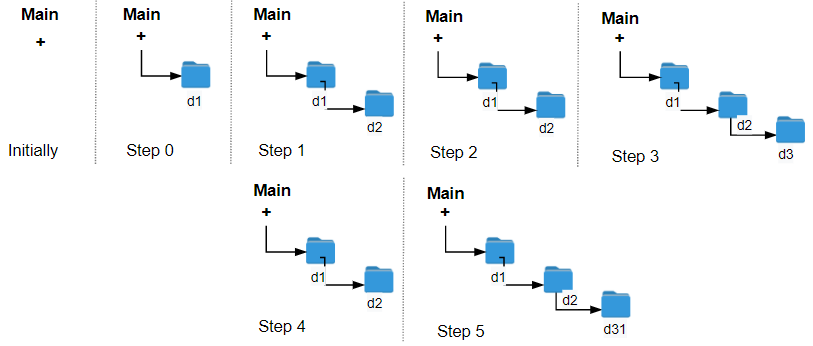Understand what the interviewer is asking for by using test cases and questions about the problem.
- Established a set (2-3) of test cases to verify their own solution later.
- Established a set (1-2) of edge cases to verify their solution handles complexities.
- Have fully understood the problem and have no clarifying questions.
- Have you verified any Time/Space Constraints for this problem?
Be sure that you clarify the input and output parameters of the problem:
O(N) and space should be O(1) including the recursive stack, N being the length of the logsRun through a set of example cases:
HAPPY CASE
Input: logs = ["d1/","d2/","../","d21/","./"]
Output: 2
Explanation: Use this change folder operation "../" 2 times and go back to the main folder.
Input: logs = ["d1/","d2/","./","d3/","../","d31/"]
Output: 3
EDGE CASE
Input: logs = ["../"]
Output: 0Match what this problem looks like to known categories of problems, e.g. Linked List or Dynamic Programming, and strategies or patterns in those categories.
Plan the solution with appropriate visualizations and pseudocode.
General Idea: We will recursively find the depth of the file traversal logs and that will be the minimum operations to return to root.
1. Write a recursive function to drill into the file system.
a. Set the basecase: Out of bound.
b. Update depth base on log function string
c. Call recursive function on next log item
2. Call the recursive function
3. Return the result.General Idea: We will iteratively find the depth of the file traversal logs and that will be the minimum operations to return to root.
1. Create a stack
2. Add/Remove items from stack
3. Return the size of stack.⚠️ Common Mistakes
Implement the code to solve the algorithm.
Recursive
class Solution:
def minOperations(self, logs: List[str]) -> int:
depth = 0
# Write a recursive function to drill into the file system
def helper(i):
# Set the basecase: Out of bound
if i > len(logs) - 1:
return
# Update depth base on log function string
nonlocal depth
if logs[i] == "../":
if depth > 0:
depth -= 1
elif logs[i] == "./":
pass
else:
depth += 1
# Call recursive function on next log item
helper(i + 1)
# Call the recursive function
helper(0)
# Return the result
return depthclass Solution {
int depth = 0;
public int minOperations(String[] logs) {
// Call the recursive function
helper(logs, 0);
// Return the result
return depth;
}
// Write a recursive function to drill into the file system
private void helper(String[] logs, int i) {
// Set the basecase: Out of bound
if (i > logs.length - 1) return;
// Update depth base on log function string
if (logs[i].equals("../")) {
if (depth > 0) {
depth--;
}
} else if (logs[i].equals("./")) {
;
} else {
depth++;
}
// Call recursive function on next log item
helper(logs, i+1);
}
}Iterative
class Solution:
def minOperations(self, logs: List[str]) -> int:
# Create a stack
stack = []
# Add/Remove items from stack
for log in logs:
if log == "../":
if stack:
stack.pop()
elif log == "./":
continue
else:
stack.append(log)
# Return the size of stack
return len(stack)class Solution {
public int minOperations(String[] logs) {
// Create a stack
var stack = new Stack<String>();
//Add/Remove items from stack
for(var log : logs){
if(log.equals("../")){
if(!stack.empty())
stack.pop();
}else if(log.equals("./")){
}else{
stack.push(log);
}
}
// Return the size of stack.
return stack.size();
}
}Review the code by running specific example(s) and recording values (watchlist) of your code's variables along the way.
Evaluate the performance of your algorithm and state any strong/weak or future potential work.
Assume N represents the size of array
